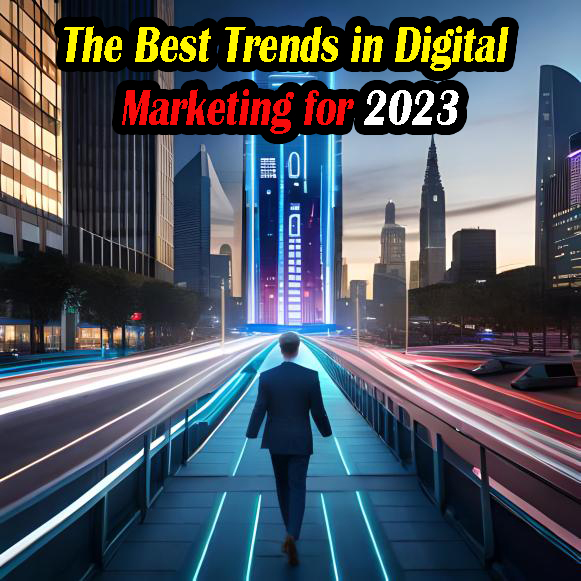Greetings from the fascinating realm of digital marketing ! Whether you’re a student looking into job options or a total newcomer fascinated by the potential of the internet world, this thorough guide will provide you with the tools and information you need to successfully navigate this ever-changing industry. Get ready for an exciting adventure that will demystify digital marketing, reveal its career possibilities, and provide you the tools you need to start your journey in this always changing business.
Understanding “digital marketing” is now essential in the rapidly changing digital world; it is no longer a luxury. This thorough guide will provide you the information and useful insights you need to successfully navigate the fascinating world of digital marketing in 2024, whether you’re a student trying to explore career opportunities or a company owner looking to increase your online presence.

What is Digital Marketing?
To put it simply, digital marketing is the process of using the internet and electronic gadgets to market and sell goods and services. It includes a wide range of constantly changing strategies and methods created especially to interact and establish a connection with your target audience on the internet. This covers a wide range of things, such as search engines, social media platforms, email marketing, mobile apps, and websites.
The art and science of using internet platforms to promote goods, services, or brands is known as digital marketing. It involves using the internet’s potential to engage, connect, and motivate your target audience to take desired activities. Let’s dissect it:
- Channels: Digital marketing encompasses various channels, including:
- Search Engines: Consider Yahoo, Bing, and Google. It’s essential to optimize your website for search engines (SEO). Putting tactics into practice to raise your website’s exposure for pertinent keywords in search engine results pages (SERPs), drawing in organic visitors.
- Social Media: Numerous platforms, like Facebook, Instagram, Twitter, LinkedIn, and TikTok, provide excellent chances for brand exposure and interaction. Creating communities and encouraging interaction on social media sites like Twitter, Instagram, and Facebook may help you engage with your audience more personally and increase brand loyalty.
- Email Marketing: creating enticing email content to nurture prospects and keep clients. Using customized campaigns and email newsletters to develop relationships, nurture prospects, and increase conversions.
- Content Marketing: generating informative and engaging material (blogs, videos, infographics) for your audience. Creating insightful and interesting material (blogs, videos, infographics) that draws viewers in, informs them, and demonstrates your brand’s authority.
- Paid Advertising: displaying tailored advertisements on websites like as Facebook, Instagram, and Google Ads.
- Pay-Per-Click (PPC) Advertising: Using social network advertising and platforms like Google Ads to target audiences with ads that are relevant to their interests, demographics, and online activity.
- Mobile Marketing: Utilizing mobile-friendly websites, applications, and targeted advertising to connect with people on their smartphones while recognizing the dramatic increase in mobile browsing.
- Analytics and Measurement: tracking and evaluating information from several sources to gauge the success of your campaigns, calculate the return on investment (ROI), and hone your tactics for ongoing development.
- Affiliate Marketing: Partnering with other companies to market their goods or services on your platform in exchange for commissions on sales made.
- Influencer Marketing : Engaging influencers to endorse or suggest your goods or services to their internet following is known as influencer marketing. Because certain influencers have built strong trust with their followers, influencer marketing is effective. Influencer marketing is a useful tool for increasing sales and brand recognition. Start by reading our beginner’s guide to learn about influencer marketing.
- Video Marketing: Although video marketing is still a relatively new idea in digital marketing, its popularity has grown to the point where it is unavoidable. It entails making videos and posting them to social media sites like Instagram, TikTok, and YouTube in order to advertise a service, good, or brand.
Millions of people visit video sites every month to watch videos for leisure, education, or merely to help them decide what to buy.
Including video in your SEO, content, and social media marketing strategies is the greatest approach to maximize the impact of video marketing.
The best place to launch a video marketing campaign is YouTube; our comprehensive guide will provide you all the information you need.
- Audience Targeting: Using digital marketing, you may identify the demographics, hobbies, activity, and location of your target clientele. Put an end to spray-and-pray advertising!
- Measurable Results: Digital marketing initiatives are far more trackable than traditional marketing. Clicks, conversions, engagement rates, and other metrics are all measurable.
Why Is Digital Marketing Important?
- Cost-Effectiveness: Compared to traditional approaches, digital marketing is frequently less expensive. You don’t have to break the cash to reach a worldwide audience.
- Audience Engagement: Building closer connections with your audience is possible through targeted messaging and personalized content.
- Adaptability: Digital marketing enables you to quickly adjust to changes in the market and client preferences in a world that is changing quickly.
- Global Reach: Overcome geographical limitations to establish connections with prospective clients globally.
How Digital Marketing Works
- Define Your Audience: Recognize the requirements, preferences, and pain areas of your ideal client.
- Set Clear Goals: What goals do you have in mind? Sales, social media followers, internet traffic, or brand awareness?
- Choose Your Channels: Choose the appropriate channels based on your objectives. If you’re a newbie, concentrate on a few platforms instead of using them all.
- Create Engaging Content: Content reigns supreme! Create content for your audience-focused blog, videos, and social media updates.
- Optimize for Search Engines: Understand the fundamentals of search engine optimization. Meta tags, excellent content, and keywords.
- Leverage Social Media: Talk to your audience, post insightful articles, and place targeted advertisements.
- Measure and Adjust: Utilize analytics tools to monitor your advancement. Adapt your plan in light of the findings.
Digital Marketing as a Career for Students
If you’re a student considering a career in digital marketing, here’s what you need to know:
- Learn Constantly: The digital world is changing quickly. Keep abreast with tools, trends, and best practices.
- Certifications: Think about obtaining a certification in HubSpot, Google Ads, or Google Analytics. Your profile gains credibility as a result.
- Internships: Get hands-on experience by participating in internships. Use what you’ve learned in practical situations.
- Networking: Participate in webinars, industry events, and professional networking. Making connections opens doors.
- Creativity and Analytical Skills: Both analytical abilities and creativity are needed for digital marketing (for data analysis and content creation).
Keep in mind that engaging with people is more important in digital marketing than merely using stats and algorithms. Make your impact in the online world and embrace the digital revolution, regardless of your level of experience as a marketer.
Digital Marketing Strategy
A digital marketing plan aids firms in connecting with clients via the internet, much like a road map. It’s a strategy outlining the actions a company may take to reach out to internet users.
Because it guarantees that a company employs the appropriate tools and approaches to fulfill its goals, a digital marketing strategy is crucial. The digital marketing manager is in charge of developing and carrying out this plan.
Together with their team, the digital marketing manager makes sure that everything they do online follows the strategy and advances the company’s objectives.
Example of a Digital Marketing Strategy
In order to provide you with an understanding of how companies may benefit from digital marketing, let’s look at how an online retailer of handcrafted jewelry can locate buyers who are drawn to their exquisite and distinctive offerings.
An illustration of a digital marketing tactic they may employ is as follows:
Make a website: To highlight its products and make it simple for prospective buyers to learn more about them, the company must first build a website. The website should load quickly, be responsive to mobile devices, have crisp product photos, sufficient product information, and a simple checkout procedure.
Formulate a content marketing plan: The next action they may do is produce blog entries, social media updates, and more jewelry-related content (such as attractive infographics). They may provide material that features their goods and offers beneficial jewelry-related information.
For instance, blog entries regarding the ideal metal for a ring or the finest ways to clean jewelry that is handcrafted. The main objectives are to:
- Provide material that will appeal to readers who share your interests in related subjects.
- Make the company a recognized expert in the handcrafted jewelry industry.
Launch an SEO Campaign: Using search engine optimization is the third stage. The company may make their website more search engine friendly so that it shows up highly in the results when customers look for keywords associated with their jewelry.
This is the most effective strategy to expand an internet business over time, but it’s not a simple process that will require a lot of time and effort.
Once you rank well on Google for your desired keywords, you will begin receiving sales and saving money on advertising, which together may create a successful business with all the extra advantages.
Launch a Google Ads Campaign: After SEO is complete, the next step is to advertise on Google for a fee. To draw potential clients interested in their products, the company can place targeted advertisements on third-party websites, Google search, and other Google tools (including Gmail and Google Discover).
The business may target consumers with its product adverts by providing eye-catching content that corresponds with their Google searches and website visits.
Promote items on social media: The company may set up social media profiles and upload pictures and descriptions of their jewelry there, acting as a counter to Google Ads. Additionally, they may target particular interests and demographics via social media advertising.
Email marketing campaigns: As their traffic and audience grow, companies may begin gathering prospective clients’ email addresses and contacting them with tailored offers and discounts in an effort to encourage conversions.
Invest in video marketing: As an extra measure and because their products are visual, they may make films that show off their jewels and the manufacturing process. To draw in new clients, the company might post these movies on its website and on social media.
The aforementioned is a basic illustration of how a company may leverage a range of digital marketing strategies to boost its online presence and attract more customers to its products.
Related Article : What is an Affiliate Marketing, How to Get Started, and Examples
Related Article : The Power of Social Media in Digital Marketing 2024
Please Follow Me on Social Media
Following me on social media is as easy as a few clicks. Simply search for my handle or name on your preferred social media platform and hit that “Follow” or “Subscribe” button. Here are the platforms you can find me on:
- Twitter: @ShahSumsh
- Instagram: @shah.alam.shumsh
- Facebook: ShahTech
- LinkedIn: YourProfile
- YouTube: ShahTech



